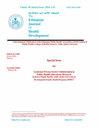哈萨克斯坦自愿接种COVID-19疫苗:民众意见
IF 0.4
4区 医学
Q4 PUBLIC, ENVIRONMENTAL & OCCUPATIONAL HEALTH
Ethiopian Journal of Health Development
Pub Date : 2021-01-01
DOI:10.32921/2225-9929-2021-3-43-48-53
引用次数: 0
摘要
研究目的:评估哈萨克斯坦共和国人口对自愿接种covid -19疫苗的态度。该研究是以作者从2021年3月至5月进行的社会学调查结果为基础进行的。该调查是在未接种COVID-19疫苗的居民中进行的。受访者总数为252人,其中女性占60.7% (n = 153),男性占39.4% (n = 99)。调查对象的平均年龄为31.7±12.5岁。总共84.5%的受访者不同意接种疫苗,8.3%的受访者难以回答。根据我们的数据,38%的受访者认为疫苗接种的有效性尚未得到充分证实,31%的受访者确信针对COVID-19的疫苗对人体健康有害。17%的答复者指出,无法获得有关疫苗的信息,其中大多数来自农村人口。公众无法获得COVID-19疫苗接种的宣传,特别是在农村地区。我们假设,拒绝自愿接种疫苗的主要原因是,大多数人认为,针对COVID-19的疫苗的有效性尚未得到完全证实,它们可能对健康有害。需要卫生组织和各种公共组织广泛开展积极的公众宣传活动,以增强公众对COVID-19疫苗预防的信心本文章由计算机程序翻译,如有差异,请以英文原文为准。
Voluntary Vaccination Against COVID-19 in Kazakhstan: Opinion of the population
The aim of the study: to assess the attitude of the population of the Republic of Kazakhstan to voluntary vaccination against COVID-19.Methods. The study is based on the results of a sociological survey conducted by the authors from March to May 2021. The survey was conducted among residents who have not been vaccinated against COVID-19. The total number of respondents is 252, of which 60.7% (n = 153) are women and 39.4% (n = 99) are men. The average age of the respondents was 31.7 ± 12.5.Results. In total 84.5% of respondents did not agree to receive the vaccine, and 8.3% found it difficult to answer. According to our data, 38% of respondents believe that the effectiveness of vaccination is not fully proven, and 31% are sure that vaccines against COVID-19 are harmful to human health. 17% of the respondents noted that information about the vaccine was not available, most of which were from the rural population.Conclusions. Advocacy for COVID-19 vaccination is not available to the public, especially in rural areas. We hypothesize that the main reason for the rejection of voluntary vaccination is that the majority of the population believes that the effectiveness of vaccines against COVID-19 is incompletely proven and they can be harmful to health. Requires a wide range of active public awareness activities by health organizations and various public organizations to increase public confidence in COVID-19 vaccine prevention
求助全文
通过发布文献求助,成功后即可免费获取论文全文。
去求助
来源期刊

Ethiopian Journal of Health Development
PUBLIC, ENVIRONMENTAL & OCCUPATIONAL HEALTH-
CiteScore
0.80
自引率
0.00%
发文量
0
审稿时长
>12 weeks
期刊介绍:
The Ethiopian Journal of Health Development is a multi and interdisciplinary platform that provides space for public health experts in academics, policy and programs to share empirical evidence to contribute to health development agenda.
We publish original research articles, reviews, brief communications and commentaries on public health issues, to inform current research, policy and practice in all areas of common interest to the scholars in the field of public health, social sciences and humanities, health practitioners and policy makers. The journal publishes material relevant to any aspect of public health from a wide range of fields: epidemiology, environmental health, health economics, reproductive health, behavioral sciences, nutrition, psychiatry, social pharmacy, medical anthropology, medical sociology, clinical psychology and wide arrays of social sciences and humanities.
The journal publishes the following types of contribution:
1) Peer-reviewed original research articles and critical or analytical reviews in any area of social public health. These papers may be up to 3,500 words excluding abstract, tables, and references. Papers below this limit are preferred.
2) Peer-reviewed short reports of research findings on topical issues or published articles of between 2000 and 4000 words.
3) Brief communications, and commentaries debating on particular areas of focus, and published alongside, selected articles.
4) Special Issues bringing together collections of papers on a particular theme, and usually guest edited.
5) Editorial that flags critical issues of public health debate for policy, program and scientific consumption or further debate
 求助内容:
求助内容: 应助结果提醒方式:
应助结果提醒方式:


